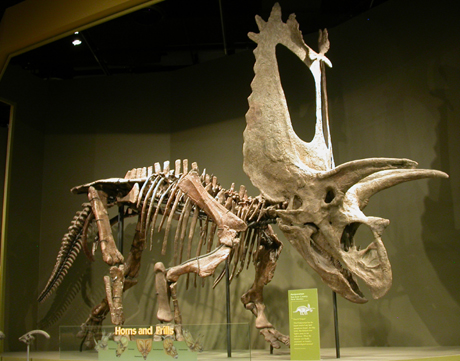Torosaurus latus - Cretaceous Dinosaurs
Homepage > Cretaceous Dinosaurs - Torosaurus latus
(taw-roh-sor-uhss)
"perforated lizard"
Describer Marsh, 1891
Also Known As --
Type of Species latus
Order Ornithischia
SubOrder Cerapoda
InfraOrder Ceratopsia
Micro-Order --
Family Ceratopsidae
SubFamily Ceratopsinae
Size 25 feet (7.5 meters) long
Period Late Cretaceous, 70 million years ago
Fossilsite Wyoming, South Dakota, Colorado, Utah, USA;
Saskatchewan, Canada
Diet Herbivore
Torosaurus lived during the Late Cretaceous Period about 70 million years ago in what is now North America. Torosaurus had an enormous head that measured 8 feet (2.5 meters) in length. Its skull is one of the largest know up to date, no other land animal has ever had a skull larger than Torosaurus. Torosaurus frill made up about one-half the total skull length.
The frill had two symmetrical openings that reduced its weight. It had two eyebrow horns right above its eyes and a third small horn on its snout. All three horns pointed forward.
Torosaurus like many other neoceratopsians, was a herbivore that sheared off tough plant material with its sharp beak powered by its strong shearing jaws. It would then ground this plant material with the many rows of teeth in the back of its mouth.
Torosaurus was not much smaller than its close relative, Triceratops, but because of its slender build, it probably weighed a lot less. The fact that few specimens from Torosaurus have been found suggests that this dinosaur was much less abundant than Triceratops.
Discovery
Torosaurus was discovered in 1889, in Wyoming by John B. Hatcher. John
sent the specimen to Charles O. Marsh, who would later name the specimen
Torosaurus latus, in recognition of the bull-like size of its skull and
its large eyebrow horns. Ever since, the specimen has been in display
at the Peabody Museum in New Heaven, Connecticut.
